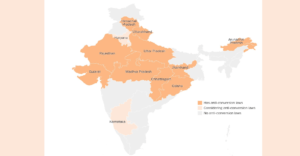Over 200000 Indian Christians Protest Against Arunachal Pradesh’s Anti-Conversion Law
Over 200,000 Indian Christians gathered in Arunachal Pradesh to protest the state’s new anti-conversion law, the Arunachal Pradesh Freedom of Religion Act, set to take effect by the end of March. The law requires individuals to get permission from local authorities before converting or receiving baptism. The Arunachal Pradesh Christian Forum (APCF) argues that the law infringes on religious freedom and secularism, specifically targeting Christianity. They emphasize that converting to Christianity does not erase tribal practices but moves away from animism.
Christian Solidarity Worldwide (CSW) also condemned the law, calling it unconstitutional. Protestors urge the government to reconsider the law and repeal similar laws in other states. The issue highlights a larger debate on religious rights and freedom in India.

Over 200000 Indian Christians Protest Against Arunachal Pradesh’s Anti-Conversion Law
Over 200,000 Indian Christians recently gathered in Arunachal Pradesh to protest the state’s new anti-conversion law, the Arunachal Pradesh Freedom of Religion Act (APFRA), which is set to come into effect by the end of March. This law, similar to those already in place in 11 other states across India, mandates that individuals who wish to convert to another religion must first obtain permission from the local administration. Additionally, anyone seeking baptism must follow this procedure. If a person converts without prior approval, the priest or pastor who performs the baptism could face serious consequences, including arrest or a fine.
The protest, led by the Arunachal Pradesh Christian Forum (APCF), is rooted in concerns about religious freedom and secularism. The APCF strongly believes that this law undermines these principles, especially since it specifically targets Christian practices, such as baptism.
According to Tahr Miri, the president of the APCF, the law is unjust because it applies only to Christianity and doesn’t affect other tribal religions. He pointed out that, while Christianity may be perceived as a foreign religion, tribal people who convert to Christianity do not abandon their cultural traditions but instead leave behind animism—the belief that inanimate objects like rocks and trees possess spiritual power. Miri emphasized that Christianity doesn’t erase tribal culture but adapts it, allowing converts to retain their tribal practices.
The controversy surrounding the law stems from its potential to disrupt religious and cultural identities in Arunachal Pradesh. The state is home to more than 26 distinct tribal groups, each with its own traditions and beliefs. Some supporters of the anti-conversion laws argue that the spread of Christianity is a threat to these ancient tribal customs. They claim that conversions lead to the erosion of indigenous practices, replacing them with foreign religious beliefs. However, the protestors argue that this view is based on a misunderstanding of how Christianity interacts with tribal cultures.
For example, Tahr Miri and other leaders in the Christian community point out that converts to Christianity often continue to honor their tribal heritage. They clarify that the adoption of Christianity doesn’t involve abandoning tribal identity or practices but simply marks a shift away from animistic beliefs toward a new religious framework. For many, this change represents a spiritual awakening, not a cultural erasure.
Christian Solidarity Worldwide (CSW), an international advocacy organization that supports religious freedom, has also voiced strong opposition to the law. Mervyn Thomas, the founder of CSW, called the anti-conversion law unconstitutional. He emphasized that laws like this violate the fundamental rights guaranteed by India’s constitution, particularly the right to freedom of religion. Thomas urged the Arunachal Pradesh government to reconsider its decision to implement the APFRA. He also made an appeal to other Indian states that have enacted similar anti-conversion laws, urging them to repeal these laws and release anyone who is currently facing charges under them.
The APCF’s protest in Arunachal Pradesh highlights a broader issue of religious freedom in India, especially for Christian communities in states with anti-conversion laws. The APCF, along with other human rights groups, argues that these laws not only infringe upon individuals’ rights to choose their religion but also contribute to religious intolerance and division within the country. In a democratic society, the right to practice one’s religion freely is a fundamental principle, and the implementation of laws that restrict this freedom can be seen as a step backward for India’s secular values.
The issue at hand is more than just a legal matter—it touches on the core of India’s cultural and religious fabric. While proponents of anti-conversion laws believe that protecting indigenous religions is important, many argue that such laws can be used to control or suppress minority faiths. The tension between preserving traditional tribal practices and allowing people the freedom to follow their religious beliefs freely is at the heart of the debate in Arunachal Pradesh and other states with similar laws.
In conclusion, the protest against the Arunachal Pradesh Freedom of Religion Act reflects a larger fight for religious liberty in India. Over 200,000 Christians have rallied to express their opposition to the law, advocating for their right to freely practice their religion without fear of government interference. They are not only standing up for their faith but also for the protection of their cultural and tribal identities, which they believe should coexist with their religious beliefs. With the support of international organizations like CSW, the APCF hopes to see the law reconsidered and ultimately repealed, ensuring that the voices of the Christian community in Arunachal Pradesh are heard and respected.
You must be logged in to post a comment.